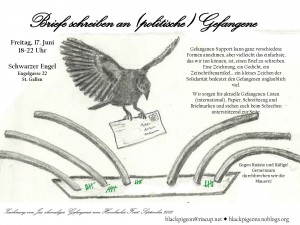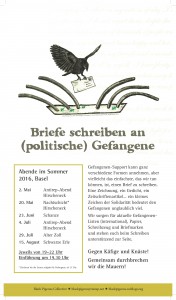Albert Woodfox (Angola 3) war 43 Jahre in Isolationshaft, im Februar wurde er endlich freigelassen. Er berichtet hier die schwierige Zeit nach dem Knast.
http://www.theguardian.com/world/2016/apr/29/albert-woodfox-43-years-solitary-confinement-wish-i-was-back
Ed Pilkington – April 29, 2016
Before walking out of jail a free man in February, Albert Woodfox spent 43 years almost without pause in an isolation cell, becoming the longest standing solitary confinement prisoner in America. He had no view of the sky from inside his 6ft by 9ft concrete box, no human contact, and taking a walk meant pacing from one end of the cell to the other and back again.
A few days ago he found himself on a beach in Galveston, Texas, in the company of a friend. He stood marvelling at all the beachgoers under a cloudless sky, and stared out over the Gulf of Mexico as it stretched far out to the horizon.
“You could hear the tide and the water coming in,” he says. “It was so strange, walking on the beach and all these people and kids running around.”
Of all the terrifying details of Woodfox’s four decades of solitary incarceration – the absence of human touch, the panic attacks and bouts of claustrophobia, the way they chained him even during the one hour a day he was allowed outside the cell – perhaps the most chilling aspect of all is what he says now. Two months after the state of Louisiana set him free on his 69th birthday, he says he sometimes wishes he was back in that cell.
“Oh yeah! Yeah!” he says passionately when asked whether he sometimes misses his life in lockdown. “You know, human beings are territorial, they feel more comfortable in areas they are secure. In a cell you have a routine, you pretty much know what is going to happen, when it’s going to happen, but in society it’s difficult, it’s looser. So there are moments when, yeah, I wish I was back in the security of a cell.”
He pauses, then adds: “I mean, it does that to you.”
The “it” to which he is referring is the “closed cell restriction”, or CCR, into which Woodfox was put in 1972, and where he remained for all but a few months until his release on 19 February. He survived about 15,000 days of isolation – a form of captivity that the United Nations has denounced as torture and that scientific studies have shown is capable of inflicting severe psychological damage on individuals in less than a week.
As a member of the “Angola Three” – former Black Panther activists who were all subject to decades of solitary confinement in Louisiana’s notorious Angola prison – Woodfox was put into CCR ostensibly for the murder of a prison guard, for which he has always insisted he was framed. His conviction was twice overturned by a federal court on the grounds that it was unconstitutional, and he walked out of custody an innocent man.
His lawyer, George Kendall, of Squire Patton Boggs LLP, fought for years to get him out of isolation, which Kendall called “extreme and cruel punishment”.
In an interview with the Guardian, Woodfox says he is finding the transition from being cooped up alone in a cell to being free more difficult than he had anticipated. “Everything is new, no matter how small or large,” he says.
The weirdest sensation is feeling profoundly uncomfortable in a crowd. “I’m not accustomed to people moving around me and it makes me nervous. Being in a cell on my own, I only had to protect myself from attack in front of the cell as I knew there was no one behind me. Now I’m in society, and I have to remind myself that the chances of being attacked are very small and would usually depend on my own actions.”
Now that he is no longer alone he has also had to learn hard lessons about communal living. In the cell, he explains, his actions only ever affected one person – himself. Now his behaviour has ramifications for others.
“For 43 years the only person who was affected by what I did was me. The most difficult thing for me now is to remember that other people are affected by my actions, whether intentional or unintentional. I’m having to learn a new value system.”
When Woodfox last spoke to the Guardian, a day after his release, he described the panic attacks he had suffered in solitary, which at times forced him to sleep night after night sitting up. Since being released, those attacks have become much less frequent, though he continues to deal with them in time-honoured fashion.
At 3am one night recently when he was staying in the guest room of his brother’s house in Houston, Texas, he woke up in a panic, drenched in sweat. “I got up and paced up and down the room for a couple of hours. I suppose I could have gone out of the house and sat in the back yard, but it never occurred to me that there were other options. I just did what I had always done – paced up and down.”
For years he told himself that if he ever got out of prison he would use his freedom to campaign against solitary confinement, to spare other people from going through the torture he endured. Now he is out, he feels that obligation all the more intensely, concerned as he is about those he has left behind in the CCR cells of Angola.
“The one thing that used to anger and frustrate me in prison was that I felt I had no voice. So I’m dedicating the rest of my life to being a voice for those still in the hell of solitary confinement – I feel such a great responsibility for them.”
He stays in touch with Kenny “Zulu” Whitmore, who was recently returned to a dormitory block in Angola having spent more than 30 years in solitary. Woodfox also spends a lot of time on the outside with Robert King, another member of the Angola Three, who was freed in 2001.
No such happy reunion is to be had, however, with the third element of the trio, Herman Wallace, who died in 2013, two days after being released from prison.
The most disturbing part of freedom, Woodfox says, has been the dawning realisation since his release that in America in 2016 there is very little sense of political or social struggle. When he entered prison in the 1970s the country was on fire with political debate; now, as he puts it, “everybody seems to be ‘Me, me, me, me, me.’ It’s all about me, what I need and how I’m going to get it.”
That public indifference has in turn, he believes, allowed solitary confinement to flourish, to the extent that 100,000 Americans are subjected to it each year.
“The people and the government and the courts have turned their back on prisons, and that lets the wardens and officers act as judge, jury and executioner,” he says. “People don’t seem to be socially aware, that’s why solitary confinement exists and why it’s so brutal. Because nobody cares.”

